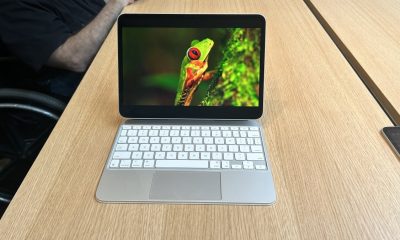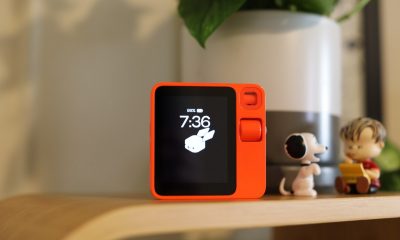Entertainment
Best laptops for kids in 2022 (UK)

Kids understand computers better than their parents. That’s just a fact of the rapidly-advancing technological age we live in. We’re talking more than YouTube and TikTok. When it comes to computers, kids really know their stuff.
It’s important too. Desktops, laptops, and tablets continue to play a bigger role in everyday life, so children are learning about the internet, word processing, coding, and other computer skills, then applying those skills to various aspects of both education and recreation. It’s more important than ever to equip your child with a device to help them learn.
When it comes to your kids, we recommend buying a laptop over a desktop. Kids will definitely benefit from the portability of laptops, especially when it comes to schoolwork. And you will benefit from the lower price point of a laptop compared to a desktop model.
The Covid-induced school closures also cemented the importance of having easy access to a laptop for homeschooling. Both teachers and parents were forced to make online learning work — and now that the groove has been found, a hybrid model may just be the future for some classrooms even after pandemic protections are a thing of the past.
How can you monitor your kid’s computer activity?
Handing a laptop to your child (and subsequently setting them loose on the internet) naturally comes with safety concerns. The screen time debate was forced into the spotlight when the coronavirus required schools to close, forcing caregivers to find a way to keep kids entertained and engaged all day, every day. Parents were told to not freak out about their kids staring at a screen while stuck at home, as the evidence connecting screen time and cognitive or behaviour development is meagre.
If you’re worried that too much freedom will result in kids landing on an inappropriate site or going into technology zombie mode, parental control software steps in to strike a healthy balance.
What’s the difference between a Chromebook and a laptop?
A Chromebook is a laptop that operates almost solely on the internet via Chrome. These aren’t inherently laptops for kids, but their low price point, cute and compact designs, and security features do make them a good option for iffy parents and kids who will be doing most of their work on a web browser.
Being locked into Chrome OS isn’t as limiting as it sounds. Actually, it provides some freedoms that regular laptops can’t. Because everything is automatically stored on Google Drive, your kid won’t lose all of their work if they forget to save a document or if the Chromebook itself crashes. This also means that kids can access their slideshow or essay on any computer where they can log into their Google account.
Kids perusing the internet might sound like a virus waiting to install itself. Every web page or Chrome app runs its own sandbox, essentially ensuring that other parts of the computer won’t be compromised even if that page gets hacked or infected with a virus.
However, malware has nothing on Chrome. Most hackers are aiming at Windows or Mac and ignore Google’s OS (for now), making it highly unlikely for a Chromebook to get a virus. If something sketchy were to happen, the threat can be wiped out by closing the page or reverting to factory settings. Parents and teachers can get some peace of mind without constantly looking over their child’s shoulder, and children can surf the web without feeling like they’re being watched.
What are the differences between laptops for younger kids versus older kids?
Some criteria makes sense for all ages. Young kids need something sturdy that can handle drops or bumps, and older kids need something that can handle being carried around in a bag alongside heavy books. Long battery life makes everyone’s life easier, too.
Processing power and storage will likely be your main deciding factors, and it all depends on what your child will be doing on the laptop. Younger kids may do some light schoolwork, play games, or watch a movie, but there’s no reason to pay for RAM over 4GB to run a few apps for school or a fancy screen to game. Faster RAM and increased screen resolution will be important for secondary school or university students who need a device that can multitask with power-sucking apps like PhotoShop or software for a statistics course. Ample storage space is a must to house things like school work and downloaded textbooks.
The key features to focus on when shopping for younger kids are security controls, size, and ease of use. Younger kids aren’t going to be editing videos or using complex applications, so save the extra features for the older siblings, who may need a faster machine with additional storage space for their school work and gaming hobbies.
What is the best laptop for your kid?
Finding the right laptop for your kid can be complicated, so we’ve tried to make the decision process a little easier. We’ve selected the models that we believe are the most kid-friendly based on a variety of needs. Remember to keep in mind what your child will ultimately be using the laptop for, and that should guide you to what best fulfils those needs at your price point.
We’ve lined up a selection of impressive options from top brands like Apple, Microsoft, and Acer. There is something for every child and budget in this list. You just need to pick a favourite.
These are the best laptops for kids in 2022.
-

 Entertainment6 days ago
Entertainment6 days agoApple Watch Series 9 vs. SE: A smartwatch skeptic tested both for 13 days
-

 Business5 days ago
Business5 days agoGoogle lays off workers, Tesla cans its Supercharger team and UnitedHealthcare reveals security lapses
-

 Entertainment6 days ago
Entertainment6 days agoThe greatest films on Prime Video right now
-

 Business6 days ago
Business6 days agoGoogle dubs Epic’s demands from its antitrust win ‘unnecessary’ and ‘far beyond the scope’ of the verdict
-

 Entertainment2 days ago
Entertainment2 days agoiPad Pro 2024 now has OLED: 5 reasons this is a big deal
-

 Business7 days ago
Business7 days agoApple: pay attention to emerging markets, not falling China sales
-

 Entertainment5 days ago
Entertainment5 days agoLoneliness in kids: Screen time may play a role
-

 Business4 days ago
Business4 days agoThe Rabbit r1 shipped half-baked, but that’s kind of the point





















